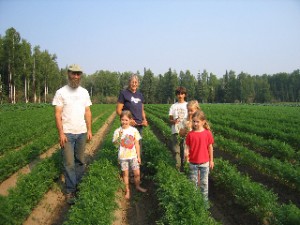Carrot king lives off the grid
October 12, 2010
474-5042
10/12/10

Pete Mayo didn’t set out to become the Tanana Valley’s “carrot king” but he has achieved that distinction through hard work and the ability to grow a crop that is apparently in great demand.
Pete, 48, and his wife Lynn, 46, own and operate Spinach Creek Farm and when interviewed in late September were up to their elbows in carrots – beautiful, bright orange, straight-as-arrows carrots – their favorite cash crop.
This season the Mayos grew 20 tons of carrots. Now that the Tanana Valley Farmers’ Market is closed the only way to their carrots is at Homegrown Market or the farmers’ market holiday bazaar at West Valley High Dec. 4.
Pete grew up in the Fairbanks area with parents who gardened and raised animals. Lynn hails from Massachusetts, bringing with her a degree in natural resources from the University of Massachusetts. When they decided the farming lifestyle was for them they spent a couple of years working for Gordon Herreid, a well-known local farmer who passed away several years ago. He served as their mentor and they learned a lot about growing strawberries and carrots from him. They also worked for Happy Creek Greenhouses and took odd jobs such as shoveling barns, peeling logs and caring for plants.
It seems they would do anything to work outdoors, which is their passion. “That and working for yourselves,” said Pete’s mother, Gail Mayo.
“That part isn’t so good,” Pete said.
The Mayos bought 60 acres in the Murphy Dome area in 1994 because of the good location. The creek running right through their land provides a good source of water.
Maybe it’s the creek water that gives the Mayos such an abundant carrot crop, but Pete isn’t saying. “We don’t really know what our secret is,” he said. “It’s so good we just grow more and more.” Luckily, the entire family likes carrots. Asked for a good carrot recipe, Lynn said they like to eat them raw.
Each fall the Mayos donate carrots for charity auctions, including Calypso Farm, North Star Ballet and the Northern Alaska Environmental Center. “I’ve heard of people paying $400 for a 10-pound bag,” Pete said.
“I’m just glad the town eats them and appreciates them,” Lynn said. “I’m glad the town likes them.”
Their yield isn’t limited to carrots though; the Mayos grow a huge variety of vegetables for their 40 community supported agriculture members, along with berries for their family. They keep chickens for eggs too.
The children, Jesse, 13, and Amy and Laura, 9, are hard workers, helping with the weeding and transplanting. “They’re good on the farm,” Lynn said, but she tries not to overdo it so much that they would start to hate the chores.

Spinach Creek employs several neighborhood teens for summer jobs. “They learn how to get dirty and play in the dirt,” Lynn said.
All summer the Mayos sell their produce at the farmers’ market twice a week, which is the most draining part for them. “It’s really busy and you don’t get much of a break,” Pete said. “You work up a sweat by the time you’ve unloaded the truck and you can’t stop for lunch.”
While it might seem things would slack off in the winter, that is the time they do the building, cleaning and repairs. “I was the only person who painted his house in January,” Pete said, explaining that he took the boards off one by one and painted them in a heated workspace. He is so handy that if the farm needs equipment he often creates it rather than buying it.
Amazingly, everything the Mayos accomplish is done off the grid. They use solar, battery and diesel power. Lynn is proud that they live off the land. “Having a nice homestead is our goal,” she said.
“And growing good food.”
“We enjoy doing something useful for the community,” Pete said. “We feel good about our work.”
Homegrown is a column written by Nancy Tarnai


